|
|
Souterliedekens are rhymed psalm translations in Dutch, set to popular tunes. They were made by the Utrecht nobleman Willem van Zuylen van Nyevelt, who is also responsible for choosing the more than 150 melodies. In this way he hoped to get the youth to sing psalm texts. The Souterliedekens were published in Antwerp in 1540. It is the first complete Psalter in any European vernacular. Nowadays we are most interested in the music: thanks to the melodies of the Souterliedekens, represented in mensural notation, we can sing many of the original secular texts. These texts are only known from sources without music, such as the Antwerp Songbook (1544). By combining the texts from the Antwerp Songbook with the melodies of the Souterliedekens we can reconstruct the popular music of the sixteenth century.
You can listen to the first stanza of all the Souterliedekens, sung by a choice of Dutch and Flemish singers, recorded in 2001 for the Repertorium of Dutch Songs until 1600.
all Souterliedekens |
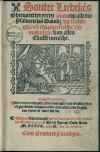 |
|
Songs from Under the Green Linden For his radio program Under the Green Linden Ate Doornbosch made some 5,000 recordings of old songs sung by people who had sung them in the beginning of the 20th century during work on the fields or at home, sitting 'under the green linden'. Because of the oral tradition every version is different. Listen to all our recordings of some ballads:
Daar ging een heer dikwijls van huis (A Man Went Often Away From Home - The False Tongue)
Een heer die sprak een meisje aan (A Man Spoke To A Maiden - The Devil's Horse)
Toen ik op Neerlands bergen stond (When I Stood On The Netherlands' Hills - The Three Horsemen)
Daar was laatst een meisje loos (There Was Once A Naughty Girl)
Drie schuintamboers (Three Nasty Drummers)
Daar waren twee koningskinderen (There Were Two Royal Children)
|
 |
|
Broadside Ballads Top 30. In 2004 the Meertens Institute and the Royal Library in the Hague placed their collections of broadside ballads on the internet, using the interface of The Memory of the Netherlands. All song sheets from the collections Wouters and Moormann were scanned and included. About 15,000 songs texts are available. There is little music on the sheets, only tune indications, as the songs were written to existing tunes. We made a top 30 of the most popular melodies, mainly from the 19th century, although some are still known and sung in the Netherlands. The recordings were made by famous Dutch singers such as Freek de Jonge, Bob Fosko, Maarten van Roozendaal and many others.
Broadside Ballad Top 30 |
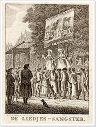 |
|
The Antwerps Liedboek was published in 1544 in Antwerp. It is the main source for our knowledge of late medieval ballads, tragic stories from the fifteenth century or earlier, which were conceived and transmitted in the oral tradition. Further, the Antwerp Songbook contains 'new songs' by the rederijkers, amateur poets who gathered in Chambers of Rhetoric. The most important issues are love, sex, drinking and merriment.
Although the songs were sung, of course, there is no notation in the Antwerp Songbook. In many cases the melodies can be found in other sources, such as the Souterliedekens (1540).
all song texts of the Antwerp Songbook
|
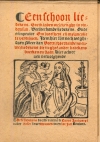 |
|
The Beggars Song Book. During the Eighty Years War (1568-1648) the Dutch fought for their independence from the Spanish King, who ruled over the Low Countries as successor of Charles V. During the Revolt they sang vehement political songs, the so-called Beggars Songs (geuzenliederen). The songs recount sieges and battles or mock the Pope, the Spanish King, and his generals. Originally distributed on broadsides, the songs were soon published as collections: Beggars Song Books. Many editions appeared, and new, current songs were added to the old ones.
all songs from the oldest known Beggars Song Book (c. 1576) |
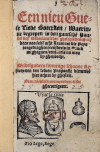
|
|
Song collection of Antonis van Butevest. Antonis Butevest or Buytevest was a cake baker and brick merchant in Leyden. Toward the end of the 16th century he compiled a manuscript with old and new songs. There are also some personal notes and refrains in the manuscript. Butevest must have been an active member of one of Leyden's Chambers of Rhetoric. Butevest collected songs on prostitution, nymphomaniacal women, deceit and drunkeness, along with more decent love complaints and May songs. The manuscript is now in the Leiden Municipal Archive.
all songs from the Butevest Manuscript |

|
|
Liedekens & Chansons. This small collection from the Soutern Netherlands from c. 1600 has a remarkable content: it praises the unmarried state from the perspective of a young woman. Or rather, the author states that by marrying the woman becomes subordinate to the man. She will have to be economical while her husband can waste money as he pleases, to mention just one thing. She would do better to stay unmarried, despite the temptations of Venus.
all songs from MS Liedekens & Chansons (c. 1660)
|
|
|
Murder Ballads. From the 16th century until the Second World War songs were performed by market singers which they also sold on broadsides. Most popular were songs about sensational events, especially murders. They were written up-to-the-minute, often before the condemnation of the murderer, but they could continue to be sung for many years after. The market singers were not shy about horrible details and mentioned the offenders and their victims by name. E.g. the broadside on the right tells how one Philip Nathan Hertog, umbrella maker in Utrecht, murdered Betje Staal from Amsterdam in 1849 with a knife, cutting 'a deep wound in the neck, near the larynx, 7 Dutch inches long'.
all murder ballads on broadsides (scans)
|
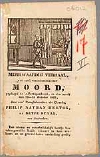 |
|
More songs on specific subjects. In the Database many songs have been provided with keywords, indicating genres, names, years, motifs and so on. These keywords are in Dutch. Here are some arbitrary examples:
drinking song (keyword "drinklied")
Catholic mocking songs set to liturgical melodies ("wilde versper")
unequal love ("standsverschil")
deflowering ("ontmaagding")
Second World War ("Tweede Wereldoorlog")
Napoleon
dog ("hond")
1600 (the year of a famous battle near Nieuwpoort)
The songs which you will find are not always presented in full text form or as scans. You can search further by filling in your own keywords in the upper bar.
|
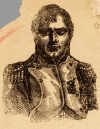 |
|
The Song of Lord Halewijn. A princess hears a man singing with an enchanting voice: Lord Halewijn. She wants to meet him in the woods and discovers he is a serial murderer of women. But she is more clever than he and beheads him with his own sword.
This ballad was sung throughout Europe. In England it is known as Lady Isabel and the Elf Knight, or May Colvin and False Sir John. The murderer is called Renaud in France and Ulrich or Ulinger in Germany. In Norway he is called Rulleman or Svein Norman, in other Scandinavian countries he has many different names. In Hungary the ballad is named after the woman, Molnár Anna. Lord Halewijn is the Flemish name. In the southern part of the Netherlands he is called Rollewijn, in the North Jan Alberts.
Lord Halewijn
|
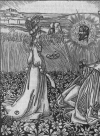
|
|
More Songs with a Story. Some of these ballads appear in many sources and in many versions. In such cases we sometimes have given some introductory information (in Dutch), e.g. a synopsis of the story, its origins, geographical distribution and so on.
Some arbitrary examples are:
Kortjakje
Griseldis
Genoveva
Floris & Blancefloer
De winter is vergangen (The Winter has gone)
Het viel een hemels dauwe (There fell a Heavenly Dew)
De hertog van Brunswijk (The Duke of Brunswick)
Ik stond op hoge bergen (I Stood on High Hills)
Hillebrand
Van liefde komt groot lijden (Love Brings Great Sufferings)
Het daagt in de oosten (It is Dawning in the East)
Twee koningskinderen (Two Royal Children)
|
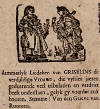
|
|
